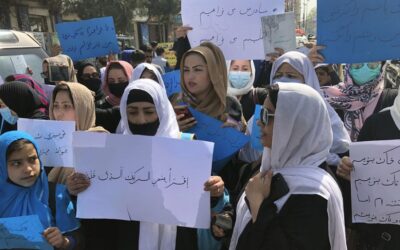southasia.foreignpolicy.com, May 9, 2014
Parnian Nazary, a representative of Women for Afghan Women, a grassroots civil society organization, recently told the Senate Foreign Relations Committee how far both she and the women of Afghanistan have come in just over a decade by recounting a harrowing story of the challenges she faced and the barriers she scaled in order to gain an education under the rule of the Taliban. While expressing her elation that Afghan women no longer have to attend secret schools and surreptitiously teach themselves English like she did, she also emphasized that these successes are fragile and at risk without the sustained support of the international community.
Nazary’s words square with my own experience in Afghanistan. When I first moved there in 2003, land mines were scattered across the once fertile farm land, women were hardly ever seen in public, and less than a million boys and only a handful of girls attended school. After a decade of persistent effort by Afghans and support from the United States and the international community, Afghanistan has changed dramatically. Pomegranates growing in orchards once littered with land mines are being packaged and exported, women actively participate in the Afghan government and civil society, and more than 8 million boys and girls are enrolled in school.
According to the United Nations, Afghanistan has experienced greater improvement in human development — a measure of health, education, and standard of living — than any other country in the world since 2000. Life expectancy alone has increased by 20 years, from 42 years to 62, and maternal mortality has decreased by 75 percent. All this progress came at less than 3 percent of the total cost of the civilian and military effort in Afghanistan.
While these achievements are substantial, Afghanistan still needs our support and attention. It remains a poor country deeply affected by 30 years of war: Half of Afghan families are surviving on less than $1.25 per day. To address this, the U.S. Agency for International Development (USAID) is continuing its work with the Afghan government to combat corruption, strengthen Afghan institutions, and encourage business growth and entrepreneurship. At the same time, USAID applies strict safeguards to ensure U.S. dollars are utilized for maximum results as we work with the Afghan government.
But if Afghanistan is to successfully navigate its way out of a cycle of extreme poverty, it will need its women, youth, and civil society to play an essential role. To this end, USAID has made it a priority to focus on these three groups. As such, we will be launching our largest gender program in the world in Afghanistan. The program, known as “Promote,” will help educate Afghan women and turn them into the country’s future business, political, and civil society leaders. At the same time, USAID is working with the Afghan government to bolster institutions of basic and higher education and to increase opportunities for youth to receive the kinds of technical and vocational training necessary to find jobs in the expanding economy. We are also helping to provide civil society groups with new skills needed to effectively address the issues facing their communities with programs such as Promote, which will enable women’s rights organizations and coalitions to influence public policy and social practices.
With an active and engaged citizenry, the many fragile gains Afghans have made can be transformed into lasting successes.
Nazary concluded her testimony by voicing a concern that many Afghan women share: that the international community will abandon Afghanistan. While Afghans are ready to take on the challenges ahead, as demonstrated by the high number of voters who turned out for the April 5 presidential election, she underscored that they cannot tackle them alone. Together with the Afghan people, the United States can help ensure that the remarkable development progress in Afghanistan is maintained and made durable, and that Afghan women like Nazary do not have to study in secret ever again. The risks and sacrifices that the people of the United States have made in Afghanistan in support of our national security interests, and the determination that the Afghan people, particularly women, have shown, demand no less.
Kathleen Campbell is the Acting Deputy Assistant to the Administrator in the Office of Afghanistan and Pakistan Affairs at the U.S. Agency for International Development. She recently testified before the Senate Foreign Relations Committee.
Noorullah Shirzada/AFP/Getty Images




0 Comments